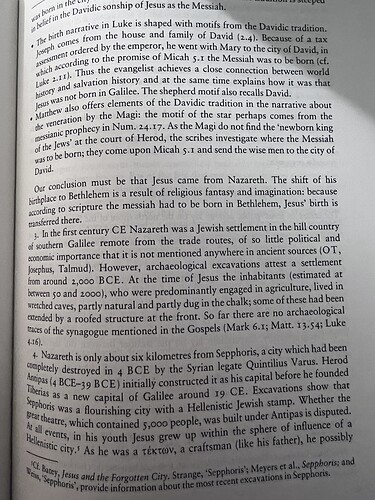Because reading wasn’t inmportant in society at that time and he lived in a poor agricultural hamlet and there would possibly have been a lot of work to do. It’s not axiomatic that Joseph would have tried to get Jesus to read, You are forcing your own worldview onto the text. Oral culture. Books are sparse. Most people couldn’t read, and if you want to speculate, how unlikely was it in a region like Nazareth?
It’s possible but why should we accept it? Nazareth was a very small agricultural community and may have required a lot of teamwork for daily life. You may simply be imagining a hierarchy and that Jesus’s family was at or near the top, something the response to him in Mark 6 completely defies.They don’t seem to know Jesus was studying in a synagogue every week, learning to read Torah. Even if Joseph/Jesus had higher standing, an assumption you have romanticizes but not established, there is no evidence he used it to get Jesus to read in a local synagogue.
We don’t even know that there was an actual synagogue building in Nazareth!!! Joseph wrangling deals with the synagogue leader and having Jesus learning to read there is more wild speculation. Theissen and Merz write (Historical Jesus A Comprehensive Guide)
Ehrman writes: “Not a synagogue building, in the days of Jesus. Archaeologiest have dug the place up. There are no public buildings of any kind. The “synagogue” would have been simply the gathering of Jewish men, not a building.”
I do believe a house was discovered. In a different article Ehrman writes:
" Does Nazareth still exist? As it turns out, another discovery was made in ancient Nazareth, a year after Salm’s book appeared. It is a house that dates to the days of Jesus. Again the principal archaeologist was Yardena Alexandre, the director of the excavation at the Israel Antiquity Authority, whom I again wrote. She has confirmed the news report. The house is located on the hill slopes. Pottery remains connected to the house ranging from roughly 100 BCE to 100 CE (i.e., the days of Jesus). There is nothing in the house to suggest that the persons inhabiting it over this time had any wealth: there is no glass and no imported products. The vessels are made of clay and chalk.
The AP story concludes that “the dwelling and older discoveries of nearby tombs in burial caves suggest that Nazareth was an out-of-the-way hamlet of around 50 houses on a patch of about four acres… populated by Jews of modest means.” No wonder this place is never mentioned in the Hebrew Bible, Josephus, or the Talmud. It was far too small, poor, and insignificant. Most people had never heard of it and those who had heard didn’t care. Even though it existed, this is not the place someone would make up as the hometown of the messiah. Jesus really came from there, as attested in multiple sources."
Maybe we should listen to the archaeologists that excavated the region? Nazareth was nowhere and filled with nobodies. As Meier writes:
If Jesus had been raised as an aristocratic intellectual in Rome or Ath- ens, or even in Jerusalem, it would be easier to speculate on the nature of his education and the level of literacy he achieved. However, he grew up in Nazareth, an insignificant village in the hills of Lower Galilee, a village so obscure that it is never mentioned in the OT, Josephus, Philo, or the early literature of the rabbis or the OT pseudepigrapha." Hence it is hard to decide what, if any, formal education would have been available to Jesus in such an environment.
Jesus coming from Nazareth is part of how we know that, in general, we are dealing with some real historical details. There may have been an open forum or a very small structure as a synagogue. But imagining a place where first born Jewish boys in Nazareth went to learn to read Torah is a flight of fancy.
And Mark writing 40 years later might really have no way of knowing what the “synagogue” looked like in Jesus’s hometown. I don’t know. Nazareth was so obscure and small and may have lacked a synagogue building completely, yet somehow you find a way to Romanticize the life of Jesus by making him upper middle class in a tiny hamlet, that wrangled deals with local leaders to teach his son an unnecessary skill. If only his fellow townspeople, the ones he grew up with, knew what you knew about Jesus’s education, the response in Mark 6 might have been different. A better suggestion might be surmising Jesus was sent away and came back with learning. Or that as a wood worker he would have traveled a bit. But Mark needs none of that. The spirit of God descends on Jesus during his baptism. Mark attributes Jesus’s insight to his status as God’s son, endowed with his spirit, not learning under a scribe or religious authority – the people Jesus actually had the most conflict with.
Bart Ehrman actually thinks Jesus could read (at least he thinks it’s more probable than not) to some degree, but also notes how this could have occurred is a huge mystery.
Vinnie
